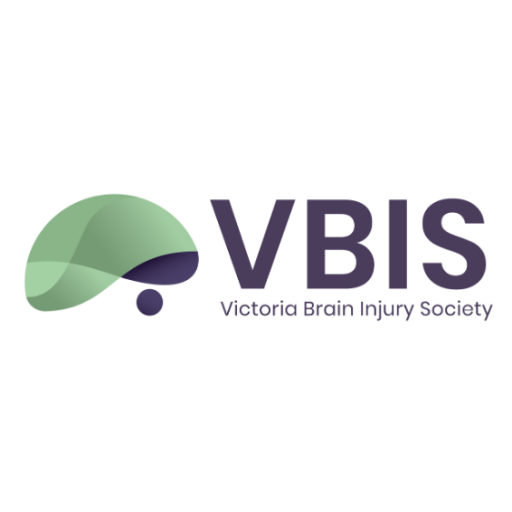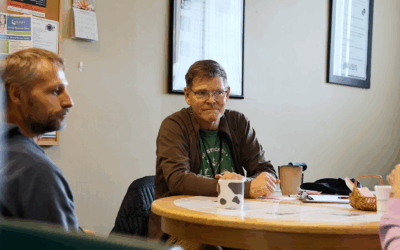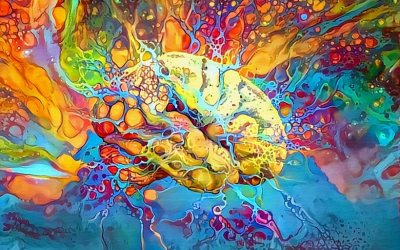By: Lisa Hanning
“I go to nature to be soothed and healed, and to have my senses put in order.”
–John Burroughs, 1912

Walking in the forest near my home on the Sunshine Coast I marvel at the way the dappled sunlight through the trees illuminates an intricately woven spider’s web, as a Raven calls out from the top of an ancient Fir while I caress its soft needles between fingers, bringing it to my noise to inhale its pungent fragrance. I let out a sigh of relief as I take in the natural beauty all around me.
Being in natural environments is a sensual experience in that we can touch, taste, listen, see and smell our way through them. I guess the same could be said for grocery stores… So, what is it about nature that is different from our built environments, like cities, big box stores, malls? What is it about nature that so often evokes a sense of wellbeing, calming our minds, rejuvenating our bodies, soothing our souls, and touching our hearts? Science has been asking this question too and has come up with some intriguing theories and yet there is still so much magic and mystery in how nature supports healing.
Increasingly, research is uncovering the healing benefits of immersing oneself and connecting with nature. In fact, there are therapeutic modalities that are based in this very principle. One such therapeutic practice is called Forest Bathing which gained in popularity in Japan in the 1980’s, referred to as Shin-rin Yoku in Japanese. The basic principle of forest bathing is to immerse oneself in a forest setting and slowly wander through it, taking in its sights, sounds, textures and smells. Noticing the way your foot connects with the Earth under it, and bringing simultaneous awareness to your breath can also be components in a Forest Bath experience.
Research in Japan, and other countries in Europe and the Americas, have found walking, sitting and spending leisurely time in a forest lowers anxiety, improves mood, lowers blood glucose levels and high blood pressure, reduces stress hormones such as cortisol and adrenaline and calms the nervous system, helping one to drop out of the fight, flight freeze response. Biochemists are starting to study and discover that tree oils boost our immune systems. Such wholistic benefits from a walk in the woods!
When it comes to the benefits of nature immersion for healing brain injuries, specifically, the research is sparse, however. Wouldn’t it be interesting to do a longitudinal comparative study for those recovering from brain injuries in highly urban environments with little to no easy access to natural settings and those living in places that have easier and regular access to nature? My hunch is that those with more regular access and time spent in natural environments may well heal more quickly and wholistically than those living in urban, built landscapes. Of course, this is sheer speculation on my part. On a personal note, I found my recovery from a moderate TBI was supported immensely by being in nature each day, carefully yet calmly walking on the uneven ground of a path through the trees and connecting with natural elements in and near forest surrounded rivers and lakes.
In a metanalysis of studies researching the effects of exposure to nature and wildlife on psychological and physiological health revealed that one of the ubiquitous benefits across one hundred studies, is stress mitigation. It is common knowledge that too much stress on a recovering brain can cause setbacks and delays in healing and recovery. Results in several studies also revealed that immersion in natural environments can also improve cognitive functioning, in various areas, including memory, attention, creativity and focus. All of which are aspects of areas of healing in acquired brain injury recovery.
According to the World Health Organisation, more than half of the world’s population has lived in an urban environment since 2014, and this number is expected to increase to 65% by 2030. With this rise in urbanization, there is a simultaneous call to reconnect with and protect nature and natural ecosystems. Along with this modern day “back to nature movement” there are new terms being coined to describe a deficit of experience in the natural world, such as: extinction of experience and nature deficit disorder.
As many of us humans seem to be more and more connected to, and seemingly dependent on technology with each passing year it might be well and good for us to remember that we are natural beings after all and connecting to the incredible design of a wildflower gone to seed in a meadow, to the sound of babbling brook, as we meander down a forest trail, to the call of an eagle as it soars high above us may be just what the doctor ordered. This is not just an expression, as more and more doctors are “prescribing” time in nature as a helpful therapy. There are even programs that can give doctors the authority to prescribe free passes for access to provincial and national parks in both the U.S and Canada.
If mobility is an issue there are many parks that can accommodate wheelchairs and walkers, Check with your local municipality for more information on the accessibility to parks and nature trails in your area.
References
https://www.npr.org/2023/08/22/1195337204/a-guide-to-forest-bathing retrieved November 9, 2024 https://pmc.ncbi.nlm.nih.gov/articles/PMC7459647/ retrieved November 10, 2024 file:///C:/Users/Owner/Downloads/Naturebasedrehabilitationforadultswithacquiredbraininjuryascopingreview.pdf retrieved November 10, 2024 https://www.cbc.ca/news/canada/british-columbia/bc-parks-canada-prescription-1.6344141 retrieved November 10, 2024. https://www.health.harvard.edu/blog/how-do-trees-and-green-spaces-enhance-our-health-202404193034 retrieved November 10, 2024.
Pyle R.M. Nature matrix: Reconnecting people and nature. Oryx. 2003; 37:206–214.



